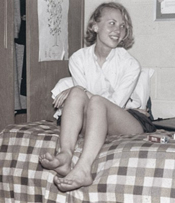For Lisa Klein, it was Sputnik. For Susan Cachel, it was the founding of the Prehistoric and Astronomy Club. For Joanna Burger, it was chasing the birds away from her father’s fields at age eight. And for Eugenia Etkina, the road to a career in science started with her vow to become the teacher her older sister would have been, had she not died young.
These stories, and 18 others, are available on a new webpage that aims to serve as a resource for women in science fields and describe the status of women in science, technology, engineering, and mathematics at Rutgers. The page is a new addition to the web presence of the Rutgers Office for the Promotion of Women in Science, Engineering, and Mathematics, headed by distinguished geneticist Joan W. Bennett.

“Most of the time, when people think of geeks, they think of guys,” Bennett said. “Our website shows that there are lots of awesome girl geeks too.” This site, she said, is the brainchild of Catherine Duckett, program manager for the Office for the Promotion of Women in Science, Engineering, and Mathematics.
“Science is a way of thinking about the universe Women who want to think scientifically have traditionally had a lot of disincentives,” said Duckett, an entomologist by training. “The women in these stories, however, overcame those disincentives, each one in her own way.”
Lisa Klein felt personally challenged by Sputnik, the world’s first artificial satellite, launched by the Soviet Union in 1957.
“I recall a visit to our elementary school by the district science coordinator, who, in my six-year-old mind, I imagined asked me personally to accept the challenge of beating the Russians,” Klein writes in her story. “I’m told that I promised my first grade teacher that I was going to MIT, but at this point this is urban legend, and I have no way to prove or disprove that I said anything that pretentious.”
Klein did, in fact, go to the Massachusetts Institute of Technology, receiving her Ph.D. from that institution in 1976. She is now a professor of materials science and engineering in Rutgers’ School of Engineering, and also is her department’s graduate director.
For Cachel, an associate professor of anthropology, the Prehistoric and Astronomy Club consisted of herself and her cousin. The cousin was the astronomy expert because he owned a telescope. “I was supposed to be the specialist in ‘All Things Prehistoric,’ which included both paleontology and archaeology because I could not make up my mind from day to day which of these things I liked the most,” Cachel writes. She now specializes in the evolution of human and nonhuman primates.
Burger, who was her father’s bird chaser, writes that her guidance counselors were less than enthusiastic when she asked to take a biology class in her junior year of high school. They expected all farm girls to become secretaries. But one day, her biology teacher feigned laryngitis and asked Burger to deliver the genetics lecture. The principal was in attendance.
“It was a set-up, the principal explained, when I went into his office,” Burger writes. “‘Your biology teacher said that we had made an awful mistake and that you’d never be happy as a secretary. I told her if she could prove to me that I was wrong, we would get you into college.’ I sat there dumbfounded.” With heavy tutoring, Burger got in to the State University of New York at Albany, and went on to get her Ph.D. at the University of Minnesota. Now, she is a professor of cell biology and neuroscience, specializing in avian behavior and ecology.
Eugenia Etkina’s older sister, Anna, realized her dream of becoming a mathematics teacher; but Anna became ill. “She had a weak heart,” Etkina writes – and, when she knew she was dying, extracted a promise from Etkina to become a teacher. Math was out, Etkina writes. Too dry. History and literature out as well because, in the old Soviet Union, to teach those subjects meant to lie. “Not biology, not chemistry because I have no memory,” Etkina writes. “So what was left? I told Dad, ‘I’m afraid I’ll have to be a physics teacher.’ He got very excited, but I at that time was not. Imagining my life full of physics scared me.” Now, an associate professor in the Graduate School of Education at Rutgers, Etkina trains physics teachers.
Bennett said more stories will be added to the website as faculty post them.